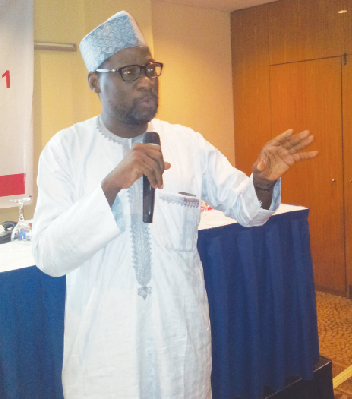Dr. Hussaini Abdu is the Country Director of Plan International Nigeria, an anti-poverty agency that focuses on child rights and vulnerable group. In this interview with Senior Correspondent, ONYEWUCHI OJINNAKA, he speaks on the prevailing corruption and poverty in Nigeria, their co-existence, impact on citizenry and how the twin problems can be tackled.
Corruption and poverty are two separate social problems, but you try to establish a linkage between the two. Can you explain the relationship?
Yes there is a relationship between corruption and poverty. The argument in our report is not that poverty in the country is caused by corruption and neither is the report saying that corruption is caused by poverty; but there is a relationship because corruption takes away the resources that ordinarily would have been invested on the poor. The resources for hospital, resources for schools, resources for water supply and sanitation, and resources for road are all pocketed by a few who have access to those resources and therefore the majority is denied the resources. That is the first dimension.
The second dimension is that corruption makes politicians and public officers put emphasis on capital-intensive programmes that fetch them enough kick-back and abandon other small level investment that can empower the poor and reduce their vulnerability. But poverty, on the other hand, creates a level of insecurity and hopelessness among the people and, therefore, some highly-placed people use the resources to take care of their future, so that they do not fall into the vulnerability of the poor. So, at all times, they try to protect against a possible fall into poverty by doing this kind of accumulation, and the accumulation that the few are actually doing is denying the poor the requisite resources that could respond to their vulnerability.
Poverty is viewed as something that usually takes place among the people at the grassroots and rural areas, while corruption is something that happens in high places, especially those at the corridors of power. How can you marry the two?
Corruption permeates everywhere because there are different levels of corruption. There is a grand corruption which I will like to describe as ‘mega corruption’ that takes place among higher officers, big contractors, politicians and senior civil servants, and there is petty corruption that takes place among lower levels, like a service provider and other levels like the police, electricity bill collectors and all those things. At any level it happens, it creates leakages because when you become pettily corrupt, it undermines effective service provisions which could impact on the poor.
The whole issue is that there are poorer people living in the rural areas, but the resources they would have been used to address their problem is being hijacked by the people at the top because they are the policy-makers. They are the one deciding where to invest resources, and so it is hijacked. And then at the delivery level, even at the local government level, you also find the resources of the people actually being taken away. So there is a relationship between the two.
There is massive investment in urban areas because that is where people can easily see things and ask questions, abandoning the rural areas and therefore deepening the poverty there and using the services they are providing in urban areas to personal aggrandisement. Check around, you find out that road construction in Nigeria is the most expensive in the world. So the question one must ask is why it costs so much to construct the roads in Nigeria. Why does it cost so much to build schools, to build hospitals? We have seen that even in ActionAid when we are there, we made effort; we built schools, we built clinics and then we find out that the cost of construction is almost sometimes 20 times less than the cost when the government is building it. Why is that different? It is different because the money is not actually going into the construction. The money is being pocketed by a few.
You said corruption and poverty are social realities that need to be tackled urgently. What proactive action can be taken against them?
The reality that we must not run away from, the most important thing we need to do, is to have political commitment. We must agree that there is poverty and then we must agree that we want to respond to it. That is number one. Every other policy issue that you will design as a result of that commitment will work. But if you do not see poverty as a problem and you do not build the political will and commitment to deal with it, whatever policies you have designed would not work. There are several policies that have been put in place since 1972 and the more policies we have, the more corruption because even in the implementation of the policy, there is corruption. Monies that are supposed to have gone to people through social protection is being pocketed by few; money that is supposed to have gone to the people is being hijacked by the elite and politicians. So if government stood over poverty reduction problem in a state or local government, you find out that the beneficiaries are members of political party who do not actually need that resources, but they are taking it. The most important thing, therefore, is the political will and then policy issues will respond. But whatever policy we have must provide social protection for the poor, ensuring that even the people who are living within the border lines do not drop. That is what social protection does. Those who are on border lines are allowed to move up but do not drop.
Facts gathered from the ActionAid report is that poverty and corruption should be tackled concurrently. Is it possible to tackle one before the other?
It is possible. But poverty is an emergency. It cannot wait. Corruption is also an emergency. It cannot wait. So both are emergencies and because they are emergencies, you have to tackle them. In fact, you can use policies and others to do that. There is no law that says that you must tackle one before the other. But what we are saying is that the more you tackle corruption, the more you are able to solve the poverty problem.
Talking about the report that is being unveiled, you talked about the perception of the auditor-general on poverty and corruption. Can you throw more light on his perception?
When I was the country director of ActionAid, the bulk of my work is working with government agencies to ensure that there are proper policies in place to deal with poverty and then working with communities, local governments and others to provide services that actually take care of the poor. Each time we make serious intervention about corruption, people in government have developed what I like to describe as a ‘Pentecostal’ approach to corruption, which is more like saying that corruption is poverty and poverty is not your portion and therefore you do not want to speak about poverty because you see it as negative. Then you also see it as an indictment on the government and so when people speak about poverty, you do not want to be involved. Even when government agencies issue report or international development agencies like ours issue report, they are concerned because they feel that the government is being indicted, which is not true. It is about the reality that people are really trying to show. So the government’s approach to change, particularly the last regime, started talking about wealth and said what we need to do is create wealth and stop bothering ourselves with poverty. But the truth is also that the wealth creation and poverty reduction are two different things. You can create wealth and poverty still increases, particularly where you have a country that is so unequal like Nigeria. We are one of the most unequal countries in the world. Our Gini coefficient is very wide and so inequality is high. You can create wealth in the sense that the richer people can continue to get richer and the poorer people are getting poorer. So they are two different things. To create wealth is good, but it is fundamental to address poverty.
The second one is on corruption. Government has often denied about the level of corruption for a long time. Each time you talk about corruption, you are told that it is perception. Then even the Transparency International (TI) report is more about perception and this perception is largely driven by civil society, the media and labour. It is because we talk about it too much, that is why our perception in that is always high. That is what you get from government. At a meeting we had, the auditor-general was the one talking about this perception issue and said the media need to be careful when talking about corruption in the country. Many of us had to remind the AG that it is reflection of his feelings as an institution to respond to issues and based on that we as an organisation took up a commitment that we need to produce a report that will speak to the realities of corruption and poverty in this country.
What are two most important lessons to be extracted from the report?
The two most important lessons to be extracted from the report is that corruption is aggravating poverty in this country. Second, there is poor documentation on the fight against corruption in the country. Our anti-corruption agencies do not have the capacity and the resources to fight corruption in this country and we need to support them to fight towards ending that social malaise.
Are there countries they were able to fight poverty and corruption simultaneously?
Yes there are. Corruption is not only in Nigeria. Corruption is everywhere, but the difference between our own case and corruption in other places is that they face it. Once you are caught, you actually face the long arm of the law; but in our own case, corruption is perpetrated with impunity. It is where you just do it and nothing happens because they believe that nothing will happen. In Scandinavian countries, corruption risk is very high and so you look at the risk before you get involved. But in our own case, the incentive is very high. When you amass resources corruptly, you can get elected as a politician, get traditional title, your children are more respected, you send them to the best schools. So the incentive is very high. Corruption had been fought successfully in Asia, Europe and even in America. The idea is, when you reduce the incentive to corruption and increase the rate of fighting corruption, you reduce the risk of poverty and the risk of actually being corrupt and invest massively for the poor. In India, more than 200 million people were moved out of poverty within 10 years, and in China, over 500 million people were actually moved out of poverty level within a decade. That is a big feat.














